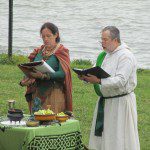On my journey from fundamentalist Christianity to Nature and Deity centered Paganism, perhaps no single figure was more helpful than Joseph Campbell. I found him at just the right time, when I was starting to get serious and realized I needed to develop a strong religious foundation based on what I did believe instead of what I didn’t.
Shortly after my religious turning point, I watched The Power of Myth over and over on PBS. I also found and read the accompanying book. It was exactly what I needed to hear at that exact point in time. Here’s an excerpt from my private journal from 2001:
From a nuts and bolts perspective, I like what Campbell says about “follow your bliss” – do what you really want to do and you’ll be happy [though I now agree with those who say “follow your bliss” devalues unpleasant but necessary work]. If you chase money or power or whatever, you’ll end up missing out.
Campbell talked about God as a force, like Star Wars – PBS said George Lucas was heavily influenced by Campbell. He chose his words very carefully, talking about common myths between religions, archetypes, and such… I think you could use Campbell’s work as justification for polytheism.
I hesitate to publish something so raw, but for someone whose only concept of God was the jealous, vengeful god of Christian fundamentalism, that was a huge step forward. Campbell wasn’t the end for me, but he was a necessary and helpful way station on my journey. I’ve heard dozens if not hundreds of other people (some Pagans, some not) say the same thing. I owe a lot to Joseph Campbell.
At the same time, I think Campbell’s ideas are contributing to some of the current discord within Paganism.
The universal doctrine teaches that all the visible structures of the world – all things and beings – are the effects of a ubiquitous power out of which they rise, which supports and fills them during the period of their manifestation, and back into which they must ultimately dissolve. – from The Hero With a Thousand Faces by Joseph Campbell
In his search for universal themes, Campbell combined and conflated widely differing myths into a “monomyth” – a soft polytheism of mythology that claims all myths are aspects of One Myth. One critic called this “a (Joseph) Campbell soup of myths that loses all local flavor.”
Many of us in the Pagan community are heavily influenced by Campbell, even if we’ve never read or seen his work. If you aren’t a devotional polytheist or if you haven’t had experiences of individual deities, his ideas of monomyth and of “God as Force” are intuitively attractive. The reverence in which Campbell is held within liberal religious circles only adds to his authority. That makes it very easy for intelligent and well-meaning Pagans to interpret polytheistic experiences (of others or even their own) through monotheistic and non-theistic lenses.
Is that wrong? I’m not going to tell anyone how to interpret their religious experiences. If Joseph Campbell’s ideas are meaningful and helpful to you, so be it – you could do far worse. But if you tell me my experience of Danu can only be seen as an aspect of a universal Goddess or as an archetype or that it must be an expression of a universal myth, we’re going to have issues.
All religions are true but none are literal. – from The Hero With a Thousand Faces by Joseph Campbell
The literal reading of religious texts is the source of much trouble in our world, but let’s not throw the baby of religion out with the dirty bathwater of literalism. When Joseph Campbell says all religions are true he’s affirming that all religions have value even though their texts and traditions aren’t historically and scientifically accurate.
But to the average reader – and that includes many Pagans – “true” implies The One Ultimate Truth. And the self-evident fact is that all religions aren’t different paths up the same mountain – they’re different paths up different mountains.
The religious impulse is a response to universal human experiences: of birth and death, of joy and suffering, of community and solitude, of wonder and awe. But our many responses have widely varying triggers and have taken widely varying forms.
 Nature centered Paganism is a response to the modern disconnection from and desecration of the Natural world. It seeks to help us live in harmony with other species and with the Earth herself. Deity centered Paganism is a response to the experience of the Gods and their stories. It seeks to help us honor them, learn from them, and work with them toward the greater good. Even though many of us are both Nature and Deity centered and there is some overlap between the two (Poseidon is a God of the Sea), these two centers of Paganism are not merely different expressions of the same goals – they have different goals.
Nature centered Paganism is a response to the modern disconnection from and desecration of the Natural world. It seeks to help us live in harmony with other species and with the Earth herself. Deity centered Paganism is a response to the experience of the Gods and their stories. It seeks to help us honor them, learn from them, and work with them toward the greater good. Even though many of us are both Nature and Deity centered and there is some overlap between the two (Poseidon is a God of the Sea), these two centers of Paganism are not merely different expressions of the same goals – they have different goals.
Now think about the sources and goals of fundamentalist Christianity, of mainline Protestantism, of Catholicism, of the branches of Judaism, Islam and Buddhism, and of all the many religions in the world. Yes, there are some commonalities, but the essence of each religion is a unique approach to a unique set of questions.
“All religions are true” does not mean all religions are ultimately the same. It means all religions have meaning and value and deserve to be treated fairly.
Not all religions deserve our respect – the Westboro Baptist Church is only the most obvious example. As a polytheist, I don’t care which Gods or Goddesses you do or don’t worship. I care that you conduct yourself honorably and that you treat other creatures and ecosystems with the dignity and respect deserved by all.
People say that what we’re all seeking is a meaning for life. I don’t think that’s what we’re really seeking. I think that what we’re seeking is an experience of being alive, so that our life experiences on the purely physical plane will have resonances with our own innermost being and reality, so that we actually feel the rapture of being alive. – from The Power of Myth by Joseph Campbell
Another source of confusion is our evolutionary instinct to divide everything into good/bad, helpful/harmful, like me/Other. When we get to know people of different religions and we see they’re basically good, we move them from the “Other” category to the “like me” category. And if someone else is “like me” then I may assume that deep down they must be seeking the same things I seek. This is not an accurate assumption.
Joseph Campbell may have been seeking an experience of being alive, but I can assure you a fundamentalist Christian is seeking to avoid going to hell when he dies. Those aren’t remotely the same goal.
We don’t have to say “deep down you’re just like me” in order to get along with another person or a different religion. We don’t have to assume they’re seeking the same things in different ways. We just have to respect their inherent dignity and worth and trust they’ll do the same for us.
I support Big Tent Paganism. I want Wiccans and Druids and Hellenists and Heathens and tree huggers and everyone else working together to support each other, to support events like Pantheacon and sites like The Wild Hunt and Patheos Pagan. Individually none of us have a critical mass. Together we do. And besides, it’s just more fun together.
But please, don’t assume what motivates you is what motivates me. Don’t assume what you seek is what I seek. And for the sake of all the Gods (quite literally) don’t insist that my experience must be interpreted through your lens.
Ask. And then listen. I’ll do the same for you. It will be a good conversation.
















